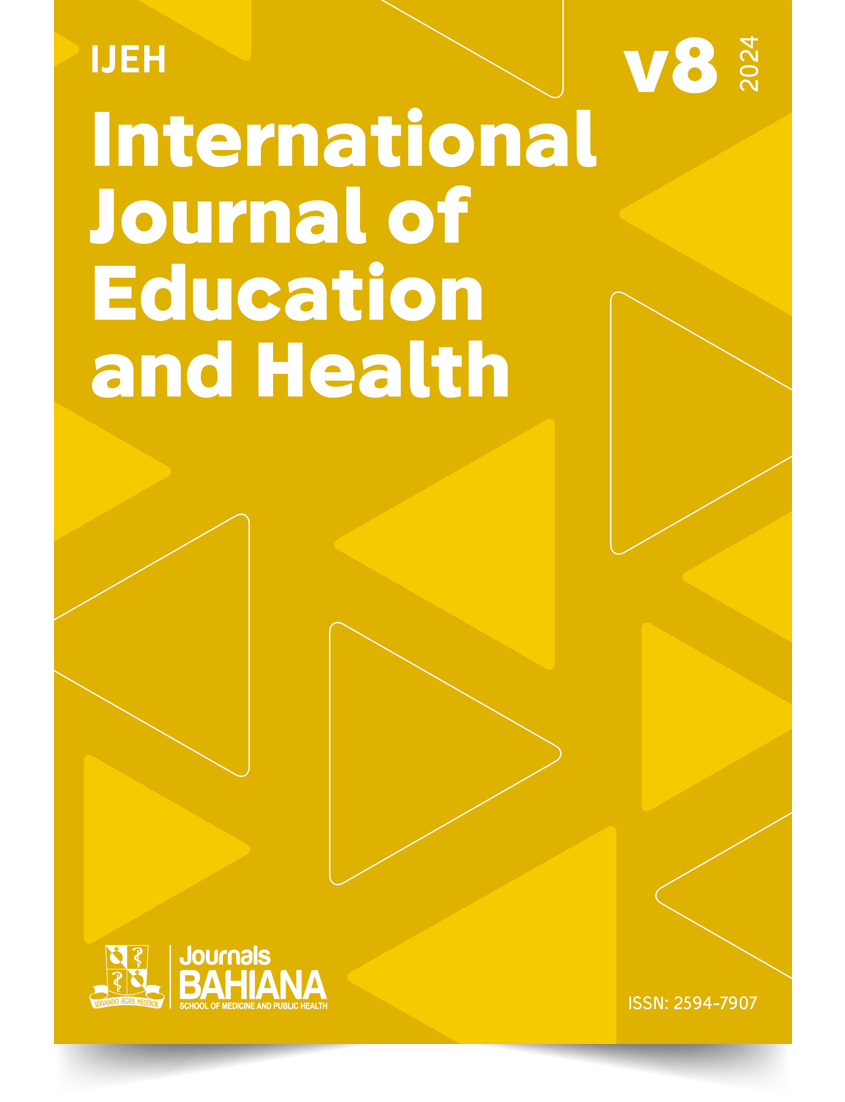Knowledge of health professionals about obstructive sleep apnea syndrome in a private hospital in Recife
DOI:
https://doi.org/10.17267/2594-7907ijeh.2024.e5451Keywords:
Obstructive Sleep Apnea, Knowledge, Health Professionals, QuizAbstract
INTRODUCTION: Obstructive sleep apnea syndrome is characterized by recurrent complete or partial obstruction of the upper airways during sleep. Difficult to diagnose, it requires interdisciplinary attention from professionals working in the hospital network. OBJECTIVE: To evaluate the knowledge of health professionals regarding obstructive sleep apnea syndrome. MATERIALS AND METHODS: This is a cross-sectional, descriptive, quantitative study, carried out in a large private hospital in the city of Recife. To assess the level of knowledge of health professionals, a self-questionnaire was applied. Statistical analysis was performed using public software developed by the Centers for Disease Control and Prevention, EPI Info in version 7.2.4.0. RESULTS: A total of 82 professionals participated in the study, including 22 nurses, 31 physiotherapists, 5 speech therapists and 24 doctors. Nursing knowledge showed a statistically significant difference in relation to other professions, in terms of the number of correct answers, with 63.45% of correct answers (p=<0.001). It was also found that the “diagnosis” category presented the lowest average number of correct answers among the evaluative categories (prevalence, anatomical structures, risk factor, signs and symptoms, diagnosis, and treatment). CONCLUSION: The level of knowledge about obstructive sleep apnea syndrome is low among the different categories of health professionals, which can lead to underdiagnosis and undertreatment. More dissemination and training on the topic need to be carried out.
Downloads
References
(1) Park P, Kim J, Song YJ, Lim JH, Cho SW, Won TB, et al. Influencing factors on CPAP adherence and anatomic characteristics of upper airway in OSA subjects. Medicine. 2017;96(51):e8818. https://doi.org/10.1097%2FMD.0000000000008818
(2) Bonsignore MR, Saaresranta T, Riha RL. Sex differences in obstructive sleep apnoea. Eur Respir Rev. 2019;28(154):190030. https://doi.org/10.1183/16000617.0030-2019
(3) Bielicki P, Trojnar A, Sobieraj P, Wąsik M. Smoking status in relation to obstructive sleep apnea severity (OSA) and cardiovascular comorbidity in patients with newly diagnosed OSA. Adv Respir Med. 2019;87(2):103-9. https://doi.org/10.5603/arm.a2019.0011
(4) Ahmad M, Makati D, Akbar S. Review of and Updates on Hypertension in Obstructive Sleep Apnea. Int J Hypertens. 2017;2017:1848375. https://doi.org/10.1155/2017/1848375
(5) Destors M, Tamisier R, Galerneau LM, Lévy P, Pepin JL. Pathophysiology of obstructive sleep apnea syndrome and its cardiometabolic consequences. Presse Med. 2017;46(4):395-403. https://doi.org/10.1016/j.lpm.2016.09.008
(6) Kapur VK, Auckley DH, Chowdhuri S, Kuhlmann DC, Mehra R, Ramar K, et al. Clinical Practice Guideline for Diagnostic Testing for Adult Obstructive Sleep Apnea: An American Academy of Sleep Medicine Clinical Practice Guideline. J Clin Sleep Med. 2017;13(3):479-504. https://doi.org/10.5664/jcsm.6506
(7) Mehrtash M, Bakker JP, Ayas N. Predictors of Continuous Positive Airway Pressure Adherence in Patients with Obstructive Sleep Apnea. Lung. 2019;197(2):115-21. https://doi.org/10.1007/s00408-018-00193-1
(8) Jung B, Daurat A, De Jong A, Chanques G, Mahul M, Monnin M, et al. Rapid response team and hospital mortality in hospitalized patients. Intensive Care Med. 2016;42(4):494-504. https://doi.org/10.1007/s00134-016-4254-2
(9) Schotland HM, Jeffe DB. Development of the obstructive sleep apnea knowledge and attitudes (OSAKA) questionnaire. Sleep Med. 2003;4(5):443-50. https://doi.org/10.1016/s1389-9457(03)00073-x
(10) Chérrez-Ojeda I, Calderón JC, García AF, Jeffe DB, Santoro I, Vanegas E, et al. Obstructive sleep apnea knowledge and attitudes among recent medical graduates training in Ecuador. Multidiscip Respir Med. 2018;13:5. https://doi.org/10.1186/s40248-018-0117-8
(11) Behrend R, Czeskleba A, Rollinger T, Petzold M, Romero YR, Raspe R, et al. Medical students' ratings of the relevance and actual implementation of interprofessional education and preferences for teaching formats: comparison by gender and prior education. GMS J Med Educ. 2020;37(2):Doc13. https://doi.org/10.3205/zma001306
(12) Hoffmann T, Worrall L. Designing effective written health education materials: considerations for health professionals. Disabil Rehabil. 2004;26(19):1166-73. https://doi.org/10.1080/09638280410001724816
(13) Salomé GM, Cunha AL, Pereira AP, Miranda FD, Alves JR. Educational handbook for healthcare professionals: Preventing complications and treating peristomal skin. J Coloproctol. 2019;39(4):332-8. https://doi.org/10.1016/j.jcol.2019.07.005
(14) Balasubramaniam R, Pullinger A, Simmons M. Sleep medicine education at dental schools in Australian and New Zealand. J Dent Sleep Med [Internet]. 2014;2(1):9–16. Available from: https://aadsm.org/journal/original_article_1_issue_11.php
(15) Mindell JA, Bartle A, Wahab NA, Ahn Y, Ramamurthy MB, Huong HTD, et al. Sleep education in medical school curriculum: a glimpse across countries. Sleep Med. 2011;12(9):928-31. https://doi.org/10.1016/j.sleep.2011.07.001
(16) Hulst RY, Pillen S, Voorman JM, Rave N, Visser-Meily JMA, Verschuren O. Sleep health practices and sleep knowledge among healthcare professionals in Dutch paediatric rehabilitation. Child Care Health Dev. 2020;46(6):703-10. https://doi.org/10.1111/cch.12799
(17) Bonanni E, Maestri M, Fabbrini M, Cirignotta F, Ferini-Strambi L, Gigli GL, et al. Sleep education in Italy. Sleep Med. 2012;13(4):450. https://doi.org/10.1016/j.sleep.2011.12.002
(18) Bian H, Smith CL. Development of a questionnaire to assess dentists' knowledge, opinion, education resources, physician cooperation, and clinical practice regarding obstructive sleep apnea (OSAQ-D). Sleep Breath. 2006;10(2):76-82. https://doi.org/10.1007/s11325-005-0045-7
(19) Ojeda IC, Jeffe DB, Guerrero T, Mantilla R, Santoro I, Gabino G, et al. Attitudes and knowledge about obstructive sleep apnea among Latin American primary care physicians. Sleep Med. 2013;14(10):973-7. https://doi.org/10.1016/j.sleep.2013.06.005
(20) Erwin AM, Noble KA, Marshall J, Cooper S. Perianesthesia Nurses' Survey of Their Knowledge and Practice With Obstructive Sleep Apnea. J Perianesth Nurs. 2019;34(1):39-50. https://doi.org/10.1016/j.jopan.2018.01.008
Downloads
Published
Issue
Section
License
Copyright (c) 2024 Jorge Luís Cassiano Alves Veras, Frederico Lins e Silva Pires Neto, Patrícia Gomes de Matos Bezerra, Suélem Barros de Lorena

This work is licensed under a Creative Commons Attribution 4.0 International License.
This work is licensed under a Creative Commons Attribution 4.0 International License.



